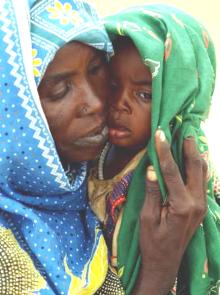Sudan conflict creates generation of “child survivors,” U.N. says
NEW YORK, July 02, 2004 (dpa) — A significant number of children are directly affected by the conflict in Sudan’s Darfur region, becoming a generation of “child survivors” as victims and witnesses of the violence there, the U.N. Children’s Fund (UNICEF) said Friday.
 UNICEF’s director of emergency operations, Dan Toole, said he recently interviewed dozens of children in camps in Darfur and in neighbouring Chad who had fled violence and witnessed murders and rapes parents, siblings and neighbours.
UNICEF’s director of emergency operations, Dan Toole, said he recently interviewed dozens of children in camps in Darfur and in neighbouring Chad who had fled violence and witnessed murders and rapes parents, siblings and neighbours.
“I spoke with scores of children, who simply tell what they have seen,” Toole said a statement made available in New York. “Infants shot in front of them, parents gunned down in fields, mothers raped, houses burned, animals killed and people being forced to run for their lives with nothing.”
“At least half a million children are among those who fled, which gives us a hint at the scale of the disaster for children,” he said.
Toole said comprehensive data on the war impact on children was difficult to collect at this stage, but he said there was enough anecdotal evidence coming from children to indicate a broad impact on their lives.
The U.N. said the conflict in Darfur has displaced more than a million people and sent tens of thousands fleeing into Chad. It blames the Islamic-led government in Khartoum for the humanitarian crisis and human rights violations in Darfur, where Khartoum-backed Arab militia forces were fighting with African rebel groups.
In an obvious effort to conceal dire conditions in a refugee camp, Sudanese authorities suddenly moved away the estimated 1,000 refugees in a camp in Meshtel before U.N. Secretary-General Kofi Annan was to visit the site on Thursday.
The camp in Meshtel was empty except for some donkeys when Annan arrived there, the New York Times reported, quoting Annan as asking, “Where are the people?”
The Times said Al Noor Muhammad Ibrahim, Sudan’s minister of social affairs, confirmed that the camp no longer existed and he suggested that Annan visit another camp with better conditions, which was visited by U.S. Secretary of State Colin Powell on Wednesday.
“It’s not because the secretary-general of the U.N. is here that we moved them,” Ibrahim was quoted as saying. He said the conditions at the camp were so grim that it had to be closed.
“We did not like seeing people living like that,” he said.
Romanian Ambassador Mihnea Motoc, president of the U.N. Security Council for July, said a resolution was being discussed that would impose an arms embargo and a travel ban on the militia groups fighting in Darfur.
Motoc said the council was waiting for more information from Sudan before taking action on the resolution that was submitted by the United States.
“The situation in Sudan is on everyone’s mind these days,” Motoc said.
